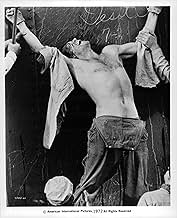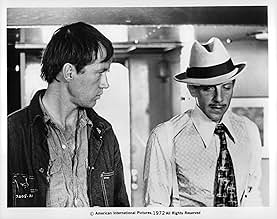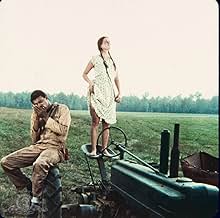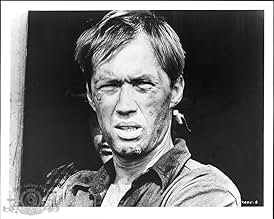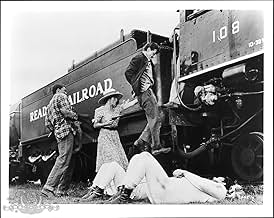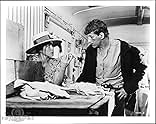PUNTUACIÓN EN IMDb
6,0/10
12 mil
TU PUNTUACIÓN
Durante la Gran Depresión, un líder sindical y una joven se convierten en delincuentes para vengarse de la compañía de ferrocarriles.Durante la Gran Depresión, un líder sindical y una joven se convierten en delincuentes para vengarse de la compañía de ferrocarriles.Durante la Gran Depresión, un líder sindical y una joven se convierten en delincuentes para vengarse de la compañía de ferrocarriles.
- Dirección
- Guión
- Reparto principal
- Premios
- 1 nominación en total
David Osterhout
- McIver #2
- (as David R. Osterhout)
Grahame Pratt
- Emeric Pressburger
- (crédito solo)
'Chicken' Holleman
- M. Powell
- (crédito solo)
Harry Northup
- Harvey Hall
- (as Harry Northrup)
Jerry Cortez
- Sheriff
- (sin acreditar)
Louie Elias
- Boxcar Tough
- (sin acreditar)
Michael Fitzgerald
- Apple Peeler
- (sin acreditar)
Gerald Raines
- Train Engineer
- (sin acreditar)
Gayne Rescher
- Brothel Client
- (sin acreditar)
Reseñas destacadas
Early, solid film from Scorcese with Hershey as the heroine, who along with Carradine leads a pack of hoods who begin as communists and progress to bigger and bigger crimes -- something of a variation on Corman's "Machine Gun Kelly." Carradine and Hershey give good, but not outstanding, performances. The direction is somewhat showy and involves a lot of movement, typical of Scorcese's more evolved style as well. Roughly follows the mold set by previous AIP gangster mama flicks, with the step up on the violence meter each succeeding film seemed to demand.
Interesting also that this is the only Corman/AIP collaboration I can remember seeing from this period of time (72) when Corman's independent operations were becoming more successful all the time (w/ the nurse movies and stewardess epics cleaning up at the box office). I can only think that they saw it as a continuation of such a successful collaboration that it was impossible to resist getting together again one more time (though Corman claims to have been so absolutely disgusted by their treatment of his epic "Gasssssss" that he would no longer work with them after 1970). Anyone with information on how this collaboration took place will make me very grateful by forwarding this information to me.
Interesting also that this is the only Corman/AIP collaboration I can remember seeing from this period of time (72) when Corman's independent operations were becoming more successful all the time (w/ the nurse movies and stewardess epics cleaning up at the box office). I can only think that they saw it as a continuation of such a successful collaboration that it was impossible to resist getting together again one more time (though Corman claims to have been so absolutely disgusted by their treatment of his epic "Gasssssss" that he would no longer work with them after 1970). Anyone with information on how this collaboration took place will make me very grateful by forwarding this information to me.
Rumor has it Martin Scorsese showed this film, his second, to John Cassavetes, who labeled the movie "sh*t" and suggested Marty work on more personal projects in the future. This advice prompted Scorsese to direct Mean Streets, the first of his many masterpieces. Boxcar Bertha is not one of them, but it isn't as bad as Cassavetes stated, either. It's an average B-movie of the kind Roger Corman would offer to his students (Marty among them).
Plotwise this picture has a more defined structure than Who's That Knocking at My Door: the setting is small-town America, the Great Depression is far from over, and a young girl named Bertha (Barbara Hershey) joins union leader "Big Bill" (David Carradine) in a violent protest against the people who are managing a railroad. When things turn ugly, the two lovers are forced to run for their lives, while still hoping they will prevail.
Hardly an original story (it's essentially the poor man's Bonnie & Clyde), but Scorsese does his best in making it appealing to audiences, shooting in beautiful countryside locations and obtaining strong performances from Hershey (who would later play Mary Magdalene in The Last Temptation of Christ) and Carradine, most notably in a sex scene that, according to everyone involved, was not faked.
Beyond that, though, it is obvious Cassavetes had a point: there is nothing that gives Boxcar Bertha that unique Scorsese feel. He just did his job without finding anything in the script he could connect to; even the religious iconography used in the bloody climax seems to have been tucked in for no particular reason.
Still, the film is enjoyable and worth seeing, even just as the product of a young filmmaker still shaping into the master he was to become.
Plotwise this picture has a more defined structure than Who's That Knocking at My Door: the setting is small-town America, the Great Depression is far from over, and a young girl named Bertha (Barbara Hershey) joins union leader "Big Bill" (David Carradine) in a violent protest against the people who are managing a railroad. When things turn ugly, the two lovers are forced to run for their lives, while still hoping they will prevail.
Hardly an original story (it's essentially the poor man's Bonnie & Clyde), but Scorsese does his best in making it appealing to audiences, shooting in beautiful countryside locations and obtaining strong performances from Hershey (who would later play Mary Magdalene in The Last Temptation of Christ) and Carradine, most notably in a sex scene that, according to everyone involved, was not faked.
Beyond that, though, it is obvious Cassavetes had a point: there is nothing that gives Boxcar Bertha that unique Scorsese feel. He just did his job without finding anything in the script he could connect to; even the religious iconography used in the bloody climax seems to have been tucked in for no particular reason.
Still, the film is enjoyable and worth seeing, even just as the product of a young filmmaker still shaping into the master he was to become.
Watching early films by classic directors in the midst of discovering their trademark style always proves to be an interesting endeavor, and Martin Scorsese's Boxcar Bertha is no exception. Made the year before Scorsese's breakthrough hit, and first tale of Italian American life on the streets, Mean Streets, Boxcar Bertha shows the legendary Scorsese adapting his own personal narrative style into a different niche, and attempting what he referred to as a "genre picture". Boxcar Bertha was first pitched as a simple exploitation film, but under the capable guiding hand of Scorsese, the final outcome is a highly enjoyable and surprisingly in depth portrait of the lifestyle and viewpoints of depression era railroad workers.
Even in this early work, Scorsese shows his almost unparalleled ability to create a shockingly vivid and humane portrait of the working class; while the film may not be set in little Italy, the same themes ring true and the characters' voices are once again perfectly captured, speaking out against repression from the upper classes and the harsh conditions of their everyday lives. Scorsese also demonstrates a knack for creating a particularly believable period look and feel; indeed, the film's set design is particularly impressive, and the audience seems to live and breathe the harsh fumes of the boxcar at the height of 1920s depression.
It's also interesting to watch the gestation of several of Scorsese's definitive film-making techniques, even in an earlier effort - his use of high speed camera zooms, bold, dramatic editing and an aggressive, wonderfully bluesy musical score may seem slightly out of place for a film such as this, but these are all vintage Scorsese moments, which, when identified as such, just make the film all the more enjoyable. There are also some moments of not so subtle religious allusions, most memorably a gruesome and hard to watch scene involving Big Bill Shelley near the film's conclusion, another Scorsese trademark. However, forced to adapt his vision to the conventions of the style of film he was instructed to make, Scorsese was forced to include several highly unnecessary nude scenes and gunfights with absurdly fake blood, which can prove entertaining on a campy level, though they detract from the more interesting aspects of the film, on the whole. It's just a shame that the subject matter the budding director was given to work with was so intentionally sparse and simplistic, but the surprising depth and complexity he extracted from what at first appeared to be a simple Bonnie and Clyde knockoff billed as a "true story" only served as a precursor for the brilliant career which was to follow.
Considering the film's original intent, it is surprising to see such a varied array of talented performances on display. Whether it is a testament to Scorsese's nearly unparalleled skill as an actor's director or the enthusiasm and dedication of the cast remains to be seen, but either way, the principle players contribute surprisingly strong performances to the film. As the film's title character, Barbara Hershey establishes a solid foundation to the film's acting front, turning a character who could easily be dismissed as repulsive into one who comes across as endearing and hard not to like due to Hershey's laid back charm. Character actor David Carradine of recent Kill Bill fame also gives a resonant and charismatic performance as 'Big Bill' Shelly, the robin hood figure of the railroads. Bernie Casey overcomes his disappointingly underwritten role with a charming and very likable performance as a fellow robber, and Barry Primus is also enjoyable to watch as yet another accomplice, and the only New Yorker in the film. (there had to be at least one) It's also great to see father and son spar off as John Carradine plays the head of a railroad who is thrown into a battle of wits with the thief and saboteur played by his real life son, and the two quiver with surprising tension and energy during their on screen encounter.
While it is highly unlikely Boxcar Bertha will come across as appealing to a widespread modern audience, there is still much to appreciate here, and the film should be considered essential viewing for Scorsese enthusiasts. Despite the film's premise as a simple exploitation film, Scorsese found the voice and soul of the time and characters, which resonate almost as fully as in any of his better known pictures. Despite the film's occasionally choppy plot structure and admittably simple subject matter, Boxcar Bertha is still a highly enjoyable and interesting early Scorsese effort which merits seeing for any fans of the director, stars, or anyone interested in the historical context. Don't pass this off just due to the Corman exploitation influence - there's much more to it than that!
-7/10
Even in this early work, Scorsese shows his almost unparalleled ability to create a shockingly vivid and humane portrait of the working class; while the film may not be set in little Italy, the same themes ring true and the characters' voices are once again perfectly captured, speaking out against repression from the upper classes and the harsh conditions of their everyday lives. Scorsese also demonstrates a knack for creating a particularly believable period look and feel; indeed, the film's set design is particularly impressive, and the audience seems to live and breathe the harsh fumes of the boxcar at the height of 1920s depression.
It's also interesting to watch the gestation of several of Scorsese's definitive film-making techniques, even in an earlier effort - his use of high speed camera zooms, bold, dramatic editing and an aggressive, wonderfully bluesy musical score may seem slightly out of place for a film such as this, but these are all vintage Scorsese moments, which, when identified as such, just make the film all the more enjoyable. There are also some moments of not so subtle religious allusions, most memorably a gruesome and hard to watch scene involving Big Bill Shelley near the film's conclusion, another Scorsese trademark. However, forced to adapt his vision to the conventions of the style of film he was instructed to make, Scorsese was forced to include several highly unnecessary nude scenes and gunfights with absurdly fake blood, which can prove entertaining on a campy level, though they detract from the more interesting aspects of the film, on the whole. It's just a shame that the subject matter the budding director was given to work with was so intentionally sparse and simplistic, but the surprising depth and complexity he extracted from what at first appeared to be a simple Bonnie and Clyde knockoff billed as a "true story" only served as a precursor for the brilliant career which was to follow.
Considering the film's original intent, it is surprising to see such a varied array of talented performances on display. Whether it is a testament to Scorsese's nearly unparalleled skill as an actor's director or the enthusiasm and dedication of the cast remains to be seen, but either way, the principle players contribute surprisingly strong performances to the film. As the film's title character, Barbara Hershey establishes a solid foundation to the film's acting front, turning a character who could easily be dismissed as repulsive into one who comes across as endearing and hard not to like due to Hershey's laid back charm. Character actor David Carradine of recent Kill Bill fame also gives a resonant and charismatic performance as 'Big Bill' Shelly, the robin hood figure of the railroads. Bernie Casey overcomes his disappointingly underwritten role with a charming and very likable performance as a fellow robber, and Barry Primus is also enjoyable to watch as yet another accomplice, and the only New Yorker in the film. (there had to be at least one) It's also great to see father and son spar off as John Carradine plays the head of a railroad who is thrown into a battle of wits with the thief and saboteur played by his real life son, and the two quiver with surprising tension and energy during their on screen encounter.
While it is highly unlikely Boxcar Bertha will come across as appealing to a widespread modern audience, there is still much to appreciate here, and the film should be considered essential viewing for Scorsese enthusiasts. Despite the film's premise as a simple exploitation film, Scorsese found the voice and soul of the time and characters, which resonate almost as fully as in any of his better known pictures. Despite the film's occasionally choppy plot structure and admittably simple subject matter, Boxcar Bertha is still a highly enjoyable and interesting early Scorsese effort which merits seeing for any fans of the director, stars, or anyone interested in the historical context. Don't pass this off just due to the Corman exploitation influence - there's much more to it than that!
-7/10
Martin Scorsese got hired by Roger Corman, I presume, to make this "based on true story" movie of a boxcar thief and robber named Bertha whom with some other robbers stole their way into a small piece in history but got into strife towards the end. It isn't one of his best pictures since he really was just the director and the script and the actors did more work than he needed to do on the picture. Like The Color of Money, it's a film that if he didn't direct it it wouldn't of made much of a difference in the outcome.
Still, give credit where credit is due, and those (very few I might think) that heard what Cassavettes said to Scoresese after the movie got released (he told Marty that it was a piece of s*** and to work on something better- which he did with Mean Streets) should disregard it. Overall, Boxcar Bertha is a watchable and good piece of cinema with some decent performances and an overall feel that works in it's "tradition of Bonnie & Clyde" genre. Hershey and Carradine are also good. Just don't expect anything ground-breaking, unlike the next 5 out of 6 movies Scorsese would make in the next eight years after this. B+
Still, give credit where credit is due, and those (very few I might think) that heard what Cassavettes said to Scoresese after the movie got released (he told Marty that it was a piece of s*** and to work on something better- which he did with Mean Streets) should disregard it. Overall, Boxcar Bertha is a watchable and good piece of cinema with some decent performances and an overall feel that works in it's "tradition of Bonnie & Clyde" genre. Hershey and Carradine are also good. Just don't expect anything ground-breaking, unlike the next 5 out of 6 movies Scorsese would make in the next eight years after this. B+
Boxcar Bertha is a fine film and entertaining at times. It supposedly tells a "true story" but I doubt we can be expected to believe every word of it. Nor should we. This is clearly the "fictionalization" version.
All the same; that doesn't make it any better. There are some good scenes here and there and a few good lines and one or two great stunts and effects.
But at the end of the day it has to be s pass for me. Not Scorsese at his best, but does show him as an up and coming director as he developed his style. So for that reason it can be counted as a historical record but nothing more.
All the same; that doesn't make it any better. There are some good scenes here and there and a few good lines and one or two great stunts and effects.
But at the end of the day it has to be s pass for me. Not Scorsese at his best, but does show him as an up and coming director as he developed his style. So for that reason it can be counted as a historical record but nothing more.
What Scorsese Film Ranks Highest on IMDb?
What Scorsese Film Ranks Highest on IMDb?
Cinema legend Martin Scorsese has directed some of the most acclaimed films of all time. See how IMDb users rank all of his feature films as director.
¿Sabías que...?
- CuriosidadesAfter he finished this film, Martin Scorsese screened it for John Cassavetes. Cassavetes, after seeing it, hugged Scorsese and said, "Marty, you've just spent a whole year of your life making a piece of shit. It's a good picture, but you're better than the people who make this kind of movie. Don't get hooked into the exploitation market, just try and do something different." Scorsese's next film was Malas calles (1973).
- PifiasThe currency shown in the film is all modern, post 1960s, with modern banking money bands.
- Citas
Boxcar Bertha: Pay no attention to that man behind the curtain.
- Créditos adicionalesOpening Statement: The following events are adapted from the true experiences of Boxcar Bertha Thompson, as related in the book "Sister of the Road"
- Versiones alternativasThe restored 2020 version added a 12 seconds shot introducing the party around the 58th minute.
- ConexionesFeatured in Directores de cine: The Films of Roger Corman (1999)
Selecciones populares
Inicia sesión para calificar y añadir a tu lista para recibir recomendaciones personalizadas
- How long is Boxcar Bertha?Con tecnología de Alexa
Detalles
Taquilla
- Presupuesto
- 600.000 US$ (estimación)
- Recaudación en todo el mundo
- 6443 US$
- Duración1 hora 28 minutos
- Color
- Relación de aspecto
- 1.85 : 1
Contribuir a esta página
Sugerir un cambio o añadir el contenido que falta

Principal laguna de datos
By what name was El tren de Bertha (1972) officially released in India in English?
Responde


